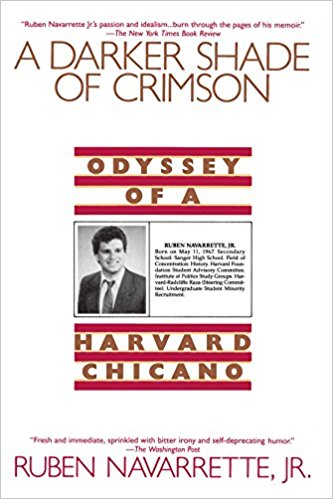Alfredo Corchado sometimes feels like a man without a country, but he’s actually a man with two countries.
It is my friend’s burden to introduce them to each other. And it is his God-given gift that he has the skill to do it.
The Mexican-American journalist was born in Durango, Mexico, but raised for the most part in El Paso, Texas — with a brief stopover in the farmland of Central California, where members of his families picked crops such as cantaloupes and tomatoes when they first arrived from Mexico.
Alfredo, his siblings and his mother came to join his father who was a “bracero” (“laborer”), one of an estimated 5 million Mexicans who were brought from Mexico into the United States from 1942 to 1964 to do — in a phrase favored many years later by President George W. Bush — “jobs that Americans won’t do.”
Specifically, the “braceros” — who got their name from the Spanish word for arm, “brazo,” as in those who work with their arms and hands — worked in the fields.
I know those fields, though thankfully not as well as my parents and grandparents do. They worked in them. I only grew up around them. Still, I know this much about the fields: They’re hot, brutal and unforgiving.
That was Corchado’s harsh welcome to California, and it was one reason that he spent much of his childhood pining away for Mexico and his later years plotting his escape to anyplace where Mexicans didn’t spend their days stooped over.
The personal stories of Mexican-Americans in the United States are as unique as snowflakes. No two are the same.
His heart in both
Corchado’s story plays out on both sides of the border. With one foot in Mexico and another in the United States, and his heart in both, my friend has told me that he doesn’t feel like he has to choose one country over the other.
As a reporter — most recently for the Dallas Morning News, and earlier at The El Paso Times and The Wall Street Journal — Corchado has made a living telling stories. He is good at it.
The veteran journalist can these days be found back home in El Paso, where he serves as the U.S.-Mexico border correspondent for the Dallas Morning News.
When he started writing books a few years ago, Corchado had to discover the letter “I” on his keyboard and learn to write his own story. He is good at that, too.
His newly released book — “Homelands: Four Friends, Two Countries, and the Fate of the Great Mexican-American Migration” — explores the uncertain and sometimes rocky terrain of what he calls “Mexico in the United States.”
That phrase refers to the millions of Mexican immigrants living in the United States, and the communities they create in towns and cities throughout the United States — from Boston to Chicago to Phoenix to San Jose.
America can’t seem to decide whether these folks are a positive or a negative. For Corchado, it’s a no-brainer.
“We’re not rapists, drug traffickers or thieves,” he told me. “We’re hardworking people who contribute in big numbers to the well-being of this country.”
The new book is about four friends — three of them, including Corchado, Americans of Mexican origin and one Mexican-American with a healthy dose of Spanish blood because he hails from New Mexico. The “hombres” gather in 1987 to compare cultural notes in an authentic Mexican restaurant in Philadelphia.
On the heels of the Immigration Reform and Control Act of 1986, which legalized nearly 3 million people, the “compadres” start a dialogue about immigration, politics, family, hometowns, love, culture, friendship and how to succeed as an American while remaining authentically Mexican.
The conversation goes on for 30 years, against the backdrop of a massive migration of people from Mexico to the United States — a development that changed the country forever.
There is something that Corchado might be able to clear up. I call it “The Mexican Mystery.”
It boils down to a simple question. Here you have all these Americans — including but not limited to many Trump voters eager to build a “big, beautiful wall” and unleash a “deportation force” to “Make America Great Again” — who can’t stop thinking about Mexicans who live in the United States.
The Americans see these Mexicans everywhere, think the country is being invaded by them, and try to figure out new ways to get rid of them. They love Mexican food, can’t live without Mexican workers, and have plenty of exposure to Mexican people. Of course, they also have strong views about Mexicans who live in the United States.
Now the question: All that being the case, why don’t Americans who are so obsessed with Mexicans know more about Mexicans?
Knowledge trumps passion
Passion is no stand-in for knowledge. Oddly, many Americans are awfully ignorant of a subject that gets them fired up.
I think of the man who approached me in a restaurant north of San Diego to talk politics. Soon, he was opining on what ails the public schools — “too many English-language learners, all these Mexican kids whose parents don’t value education.”
As a Mexican-American who aced the public education system (despite my parents, who were almost crushed by it years earlier), my experience has been that the only things that Mexican parents value more than education are family, faith and breathing.
I also think about the middle-aged woman who approached me after a recent speech to a senior adult learning course at a community college in Oceanside. The topic: America’s ambivalence toward immigrants, and how this country can’t decide whether it wants fewer of them — or more.
The woman submitted that previous waves of immigrants from places like Italy and Germany came to the United States with no trouble and “flawlessly assimilated” into society. For instance, she said, they learned English right away. Not like the immigrants of today who, she claimed, didn’t give up their language — by which she meant Spanish.
Someone needs to point out the mistakes in that line of thinking. But it’s hard to know where to begin.
First, contrary to the popular folklore that often surrounds immigration, earlier waves of immigrants did not rush headfirst into assimilation.
They congregated in ethnic enclaves in Chicago, Milwaukee, Boston, New York, Philadelphia and other U.S. cities where they cooked up authentically ethnic dishes and kept their languages alive — at least for the first two generations, even if they often wound up losing it by the third.
With regard to Mexican immigrants, it is simply not true that they are bucking the assimilation process. People think that because, on the way to work, they see a Spanish-language billboard hocking beer. That is just an example of people selling stuff in whatever language helps close the deal. Let’s not blame the fish for the bait.
Much like the immigrants of old, most of the Mexican immigrants of today will learn a few words of English. Those who don’t learn much will someday marvel at children who speak fluent English and grandchildren who likely won’t speak a word of Spanish. Along the way, everyone will pick up a variety of customs, culture and traditions.
That is the mischievous trick that America plays on immigrants. Assimilation happens, whether people are ready for it or not – and whether they want it or not.
Corchado seems to accept that. But he also insists that it is easier to leave Mexico than to forget it. Part of the reason has to do with proximity.
“Mexico is right next door, a constant reminder of our homeland, or parents’, grandparents’ homeland,” he said. “It’s like slamming the door to your relatives when they’re standing right across from you. Even those who want to forget find it increasingly difficult to cut the ties. I certainly don’t want to forget.”
A short walk home
On a personal note, I’d like it if my friend — this keen observer and talented storyteller — didn’t forget his way home to Catholicism. Though a self-described “lapsed, nonpracticing Catholic,” he doesn’t seem too far away. It could be a short walk.
Since he lived in Mexico — an almost entirely Catholic country — for 20 years, I was curious about what he thought faith meant south of the border and, just as importantly, what it meant to him.
“I don’t know that I can answer that question,” he said. “Here is what I can say: My mother says the rosary and prays on both sides of the border. I have long questioned how anyone can believe so much. It is a question that has long haunted me. I grew up Catholic in Mexico and the United States, but when I was old enough I stopped going to church.”
But one doesn’t escape faith that easily.
“Having said that, I must also confess that living in Mexico for more than 20 years, a country where democratic institutions remain too weak, impunity too high, I find myself relying on simple faith and humble prayer,” he said. “In the darkest of moments, I too believe.”
My brother journalist has a dangerous gig, having in the past poked at the hornet’s nest of drug cartels. I believe he has a guardian angel watching over him.
“I’ve also noticed over time how the Virgin of Guadalupe shadows me on both sides of the border and throughout the continent. ‘La Morenita’ is sometimes all we have.”
Corchado is not alone in believing that.
“I hear this sentiment repeatedly and more poignantly these days whenever I interview immigrants,” he said. “When the most powerful nation on earth can take away their children, all they have left is their faith. That’s powerful and humbling.”
Amen, brother.





